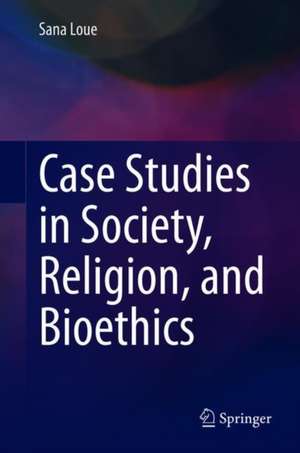Case Studies in Society, Religion, and Bioethics
Autor Sana Loue Contribuţii de Madison Carithers, Brandy L. Johnson, Hamasa Ebadi, Shaafae M. Hussain, Ried E. Mackay, Avery Zhouen Limba Engleză Hardback – 30 iun 2020
Secular and religious societies across the globe are being confronted with complex questions involving religious belief and the extent to which specific religious perspectives have in the past or should in the future be adopted as official policy. Bioethical issues involving the interplay of religion and government have become particularly notable in recent years. How these issues are resolved has major implications for individuals,healthcare providers, and the future of medical research and medical care.
Topics explored among the chapters include:
- Homosexuality: Sin, Crime, Pathology, Identity, Behavior
- Medical Error: Truthtelling, Apology, and Forgiveness
- Refusal of Medical Treatment
- Medical Deportation
- Case Study: Nazism, Religion, and Human Experimentation
- The New Frontier: Cloning
| Toate formatele și edițiile | Preț | Express |
|---|---|---|
| Paperback (1) | 463.00 lei 6-8 săpt. | |
| Springer International Publishing – 30 iun 2021 | 463.00 lei 6-8 săpt. | |
| Hardback (1) | 659.23 lei 6-8 săpt. | |
| Springer International Publishing – 30 iun 2020 | 659.23 lei 6-8 săpt. |
Preț: 659.23 lei
Preț vechi: 693.92 lei
-5% Nou
Puncte Express: 989
Preț estimativ în valută:
126.14€ • 131.71$ • 104.16£
126.14€ • 131.71$ • 104.16£
Carte tipărită la comandă
Livrare economică 15-29 aprilie
Preluare comenzi: 021 569.72.76
Specificații
ISBN-13: 9783030441494
ISBN-10: 3030441490
Pagini: 268
Ilustrații: XVIII, 268 p. 4 illus., 3 illus. in color.
Dimensiuni: 155 x 235 mm
Greutate: 0.58 kg
Ediția:1st ed. 2020
Editura: Springer International Publishing
Colecția Springer
Locul publicării:Cham, Switzerland
ISBN-10: 3030441490
Pagini: 268
Ilustrații: XVIII, 268 p. 4 illus., 3 illus. in color.
Dimensiuni: 155 x 235 mm
Greutate: 0.58 kg
Ediția:1st ed. 2020
Editura: Springer International Publishing
Colecția Springer
Locul publicării:Cham, Switzerland
Cuprins
Chapter 1. Introduction. Religion, Society, and Bioethics-.Chapter 2. Homosexuality: Sin, Crime, Pathology, Identity, Behavior-.Chapter 3. Body Modification of Minors-.Chapter 4. Medical Error: Truthtelling, Apology, and Forgiveness-.Chapter 5. Refusal of Medical Treatment-.Chapter 6. Medical Deportation-.Chapter 7. Case Study: Nazism, Religion, and Human Experimentation-.Chapter 8. Animal Experimentation in Biomedical Science-.Chapter 9. The New Frontier: Cloning-.Chapter 10. Concluding Remarks-.Index-.Index to Legal References
Notă biografică
Sana Loue, JD, PhD, MPH, MSSA, is a professor in the Department of Bioethics of Case Western Reserve University School of Medicine in Cleveland, Ohio, USA. She holds secondary appointments in Psychiatry, Epidemiology and Biostatistics, and Global Health. Dr. Loue served as the Vice Dean for Faculty Development and Diversity for almost eight years. Dr. Loue holds degrees in epidemiology (PhD), medical anthropology (PhD), social work (MSSA), secondary education (MA), public health (MPH), and theology (MA). Dr. Loue previously practiced law for 13 years. She holds an active license as an independent social worker-supervisor (Ohio) and has been ordained as a modern rabbi (Rabbinical Seminary International) and interfaith minister (The New Seminary). She has conducted research domestically and internationally, focusing on HIV risk and prevention, severe mental illness, family violence, and research ethics. She has authored or edited more than 30 books and more than 100 peer-reviewed journal articles.
Textul de pe ultima copertă
This book explores, through case studies, the interplay between religion, culture, government, and politics in diverse societies on questions arising in the domain of bioethics. The case studies draw from multiple disciplinary perspectives, including history, theology, law, bioethics, public policy, science, and medicine. The text's global perspective permits a comparison of the differing approaches adopted by countries facing similar bioethical quandaries and the extent to which religion has or has not been instrumental in addressing such dilemmas.
Secular and religious societies across the globe are being confronted with complex questions involving religious belief and the extent to which specific religious perspectives have in the past or should in the future be adopted as official policy. Bioethical issues involving the interplay of religion and government have become particularly notable in recent years. How these issues are resolved has major implications for individuals, healthcare providers, and the future of medical research and medical care.
Topics explored among the chapters include:
Secular and religious societies across the globe are being confronted with complex questions involving religious belief and the extent to which specific religious perspectives have in the past or should in the future be adopted as official policy. Bioethical issues involving the interplay of religion and government have become particularly notable in recent years. How these issues are resolved has major implications for individuals, healthcare providers, and the future of medical research and medical care.
Topics explored among the chapters include:
- Homosexuality: Sin, Crime, Pathology, Identity, Behavior
- Medical Error: Truthtelling, Apology, and Forgiveness
- Refusal of Medical Treatment
- Medical Deportation
- Case Study: Nazism, Religion, and Human Experimentation
- The New Frontier: Cloning
Caracteristici
Integrates existing literature and perspectives from multiple disciplines, e.g., bioethics, medicine, sociology, theology Offers a cross-cultural and comparative focus (across religions, countries, time periods) Uses a case-study approach
